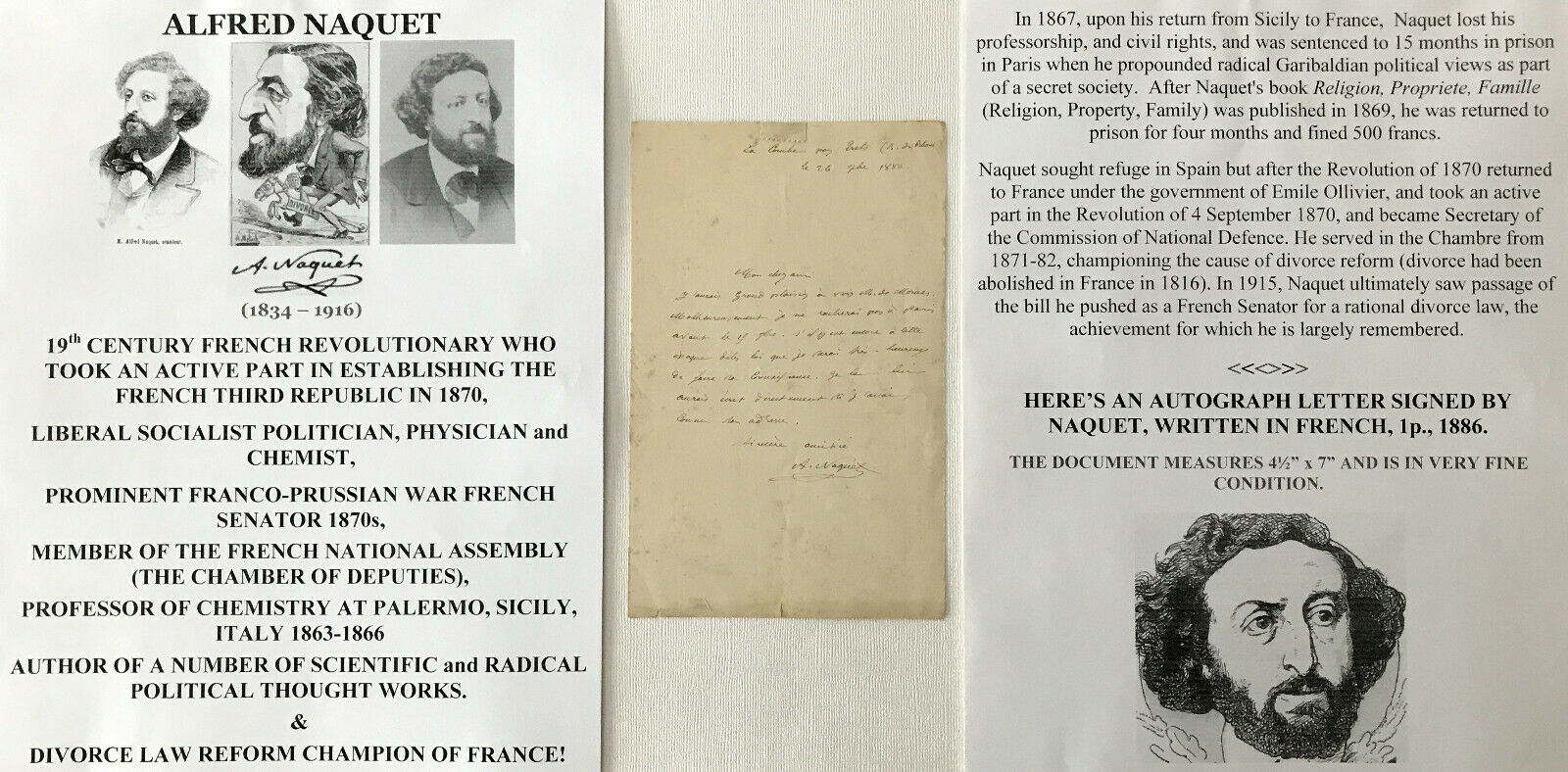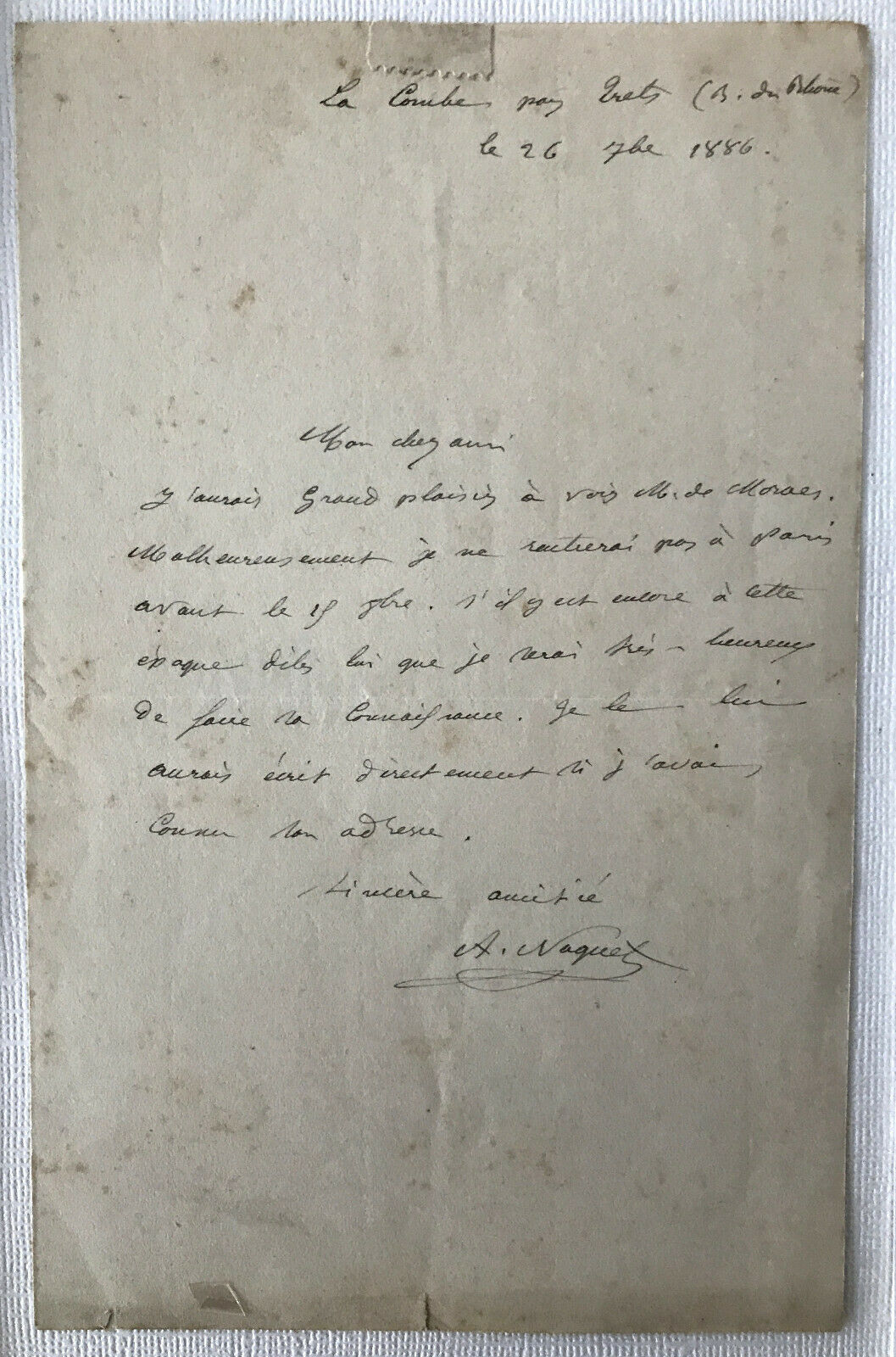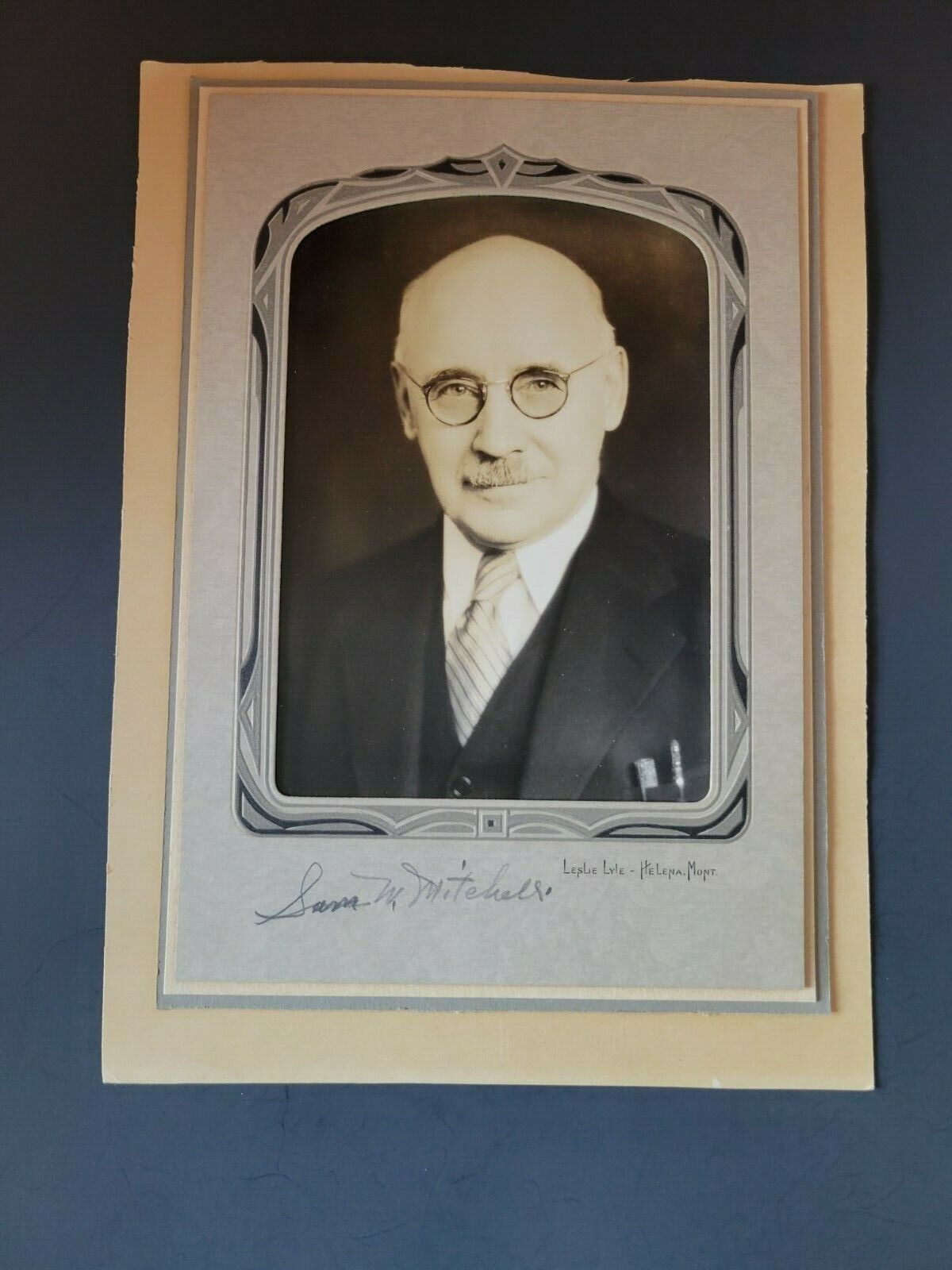-40%
FRENCH REVOLUTION FRANCO PRUSSIAN WAR SENATOR CHEMIST NAQUET LETTER SIGNED 1886!
$ 2.63
- Description
- Size Guide
Description
ALFRED NAQUET(1834 – 1916)
19
th
CENTURY FRENCH REVOLUTIONARY WHO TOOK AN ACTIVE PART IN ESTABLISHING THE FRENCH THIRD REPUBLIC IN 1870,
LIBERAL SOCIALIST POLITICIAN,
PHYSICIAN
and
CHEMIST,
PROMINENT FRANCO-PRUSSIAN WAR FRENCH SENATOR 1870s,
MEMBER OF THE FRENCH NATIONAL ASSEMBLY (THE CHAMBER OF DEPUTIES),
PROFESSOR OF CHEMISTRY AT PALERMO, SICILY, ITALY 1863-1866
AUTHOR OF A NUMBER OF SCIENTIFIC and RADICAL POLITICAL THOUGHT WORKS.
&
DIVORCE LAW REFORM CHAMPION OF FRANCE!
In 1867, upon his return from Sicily to France,
Naquet lost his professorship, and civil rights, and was sentenced to 15 months in prison in Paris when he propounded radical Garibaldian political views as part of a secret society.
After Naquet's book
Religion, Propriete, Famille
(Religion, Property, Family) was published in 1869, he was returned to prison for four months and fined 500 francs.
Naquet sought refuge in Spain but after the Revolution of 1870 returned to France under the government of Emile Ollivier, and took an active part in the Revolution of 4 September 1870, and became Secretary of the Commission of National Defence. He served in the Chambre from 1871-82, championing the cause of divorce reform (divorce had been abolished in France in 1816). In 1915, Naquet ultimately saw passage of the bill he pushed as a French Senator for a rational divorce law, the achievement for which he is largely remembered.
<
<
<>
>
>
HERE’S AN AUTOGRAPH
LETTER SIGNED BY NAQUET, WRITTEN IN FRENCH, 1p., 1886.
THE DOCUMENT MEASURES 4½” x 7” AND IS IN VERY FINE CONDITION.
<<>
::
<>>
BIOGRAPHY OF ALFRED
NAQUET
Alfred Joseph Naquet
(6 October 1834 – 10 November 1916), was a
French
chemist and politician.
Biography
Naquet was born at
Carpentras
(
Vaucluse
), on 6 October 1834. He became professor in the faculty of medicine in
Paris
in 1863, and in the same year professor of
chemistry
at
Palermo
, where he delivered his lectures in
Italian
. He lost his professorship in 1867 along with his civic rights when he was condemned to fifteen months' imprisonment for his share in a secret society. On a new prosecution in 1869 for his book
Religion, propriété, famille
he took refuge in
Spain
. Returning to France under the government of
Émile Ollivier
he took an active share in the revolution of 4 September 1870 and became secretary of the commission of national defence.
In the
French National Assembly
he sat on the extreme
Left
, consistently opposing the opportunist policy of successive governments. Re-elected to the
Chamber of Deputies of France
he began the agitation against the marriage laws with which his name is especially connected. His proposal for the re-establishment of
divorce
was discussed in May 1879 and again in 1881 and 1882, becoming law two years later. Naquet, although he disapproved in principle of a second chamber, secured his election to the
Senate of France
in 1883 to pilot his measure through that body. In 1884 by his efforts divorce became legal after three years of definite separation on the demand of one of the parties concerned.
In 1890 he resigned from the French Senate to re-enter the Chamber of Deputies (lower house of the French Parliament), this time for the 5th arrondissement of Paris, and took his seat with the
Boulangist
deputies. After Boulanger's
suicide
his political influence declined, and was further compromised by accusations (of which he was legally cleared) in connection with the
Panama scandals
.
Naquet died in
Paris
on 10 November 1916.
Works
The thesis written for his doctorate,
Application de l'analyse chimique à la toxicologie
(1859), was followed by many papers on chemistry contributed to learned journals, and his
Principes de chimie fondés sur les théories modernes
(1865) reached its 5th edition in 1890. He is better known by his political works,
Socialisme collectiviste et socialisme libéral
(1890,
Eng. trans., 1891
),
Temps Futurs: Socialisme-Anarchie
(1900),
L'Humanité et la patrie
(1901),
La Loi du divorce
(1903),
L'Anarchie et le collectivisme
(1904), and
Désarmement ou alliance anglaise
(1908)
<>
The Revolution of Sept. 4, 1870
was
a bourgeois-democratic revolution in France, which toppled the Second Empire and instituted a republic. The discontent that led to the revolution stemmed from the prolonged crisis of the Bonaparte regime and the defeat of the French armies in the Franco-Prussian War (1870-71). The revolution broke out as a result of the report of the capitulation of the French armies and the capture of Emperor Napoleon III at Sedan on Sept. 2, 1870.
The
Revolution
of
Sept.
4,
1870,
the
fourth
bourgeois
revolution
in
French
history,
led
to
the
establishment
of
the
Third
Republic.
I am a proud member of the Universal Autograph Collectors Club (UACC), The Ephemera Society of America, the Manuscript Society and the American Political Items Collectors (APIC) (member name: John Lissandrello). I subscribe to each organizations' code of ethics and authenticity is guaranteed. ~Providing quality service and historical memorabilia online for over twenty years.~
WE ONLY SELL GENUINE ITEMS, i.e., NO REPRODUCTIONS, FAKES OR COPIES!











